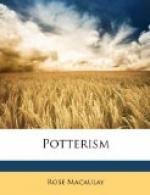In intervals of office work and social life, Jane was writing odds and ends, and planning the books she meant to write after the war. She hadn’t settled her line yet. Articles on social and industrial questions for the papers, she hoped, for one thing; she had plenty to say on this head. Short stories. Poems. Then, perhaps, a novel.... About the nature of the novel Jane was undecided, except that it would be more unlike the novels of Leila Yorke than any novels had ever been before. Perhaps a sarcastic, rather cynical novel about human nature, of which Jane did not think much. Perhaps a serious novel, dealing with social or political conditions. Perhaps an impressionist novel, like Dorothy Richardson’s. Only they were getting common; they were too easy. One could hardly help writing like that, unless one tried not to, if one had lately read any of them.
Most contemporary novels Jane found very bad, not worth writing. Those solemn and childish novels about public schools, for instance, written by young men. Jane wondered what a novel about Roedean or Wycombe Abbey would be like. The queer thing was that some young woman didn’t write one; it need be no duller than the young men’s. Rather duller, perhaps, because schoolgirls were more childish than schoolboys, the problems of their upbringing less portentous. But there were many of the same ingredients—the exaltation of games, hero-worship, rows, the clever new literary mistress who made all the stick-in-the-mud other mistresses angry.... Only were the other mistresses at girls’ schools stick-in-the-mud? No, Jane thought not; quite a decent modern set, on the whole, for people of their age. Better than schoolmasters, they must be.
How dull it all was! Some woman ought to do it, but not Jane.
Jane was inclined, in her present phase, to think the Russians and the French the only novelists. They had manner and method. But they were both too limited in their field, too much concerned with sexual relations, that most tedious of topics (in literature, not life), the very thought of which made one yawn. Queer thing, how novelists couldn’t leave it alone. It was, surely, like eating and drinking, a natural element in life, which few avoid; but the most exciting, jolly, interesting, entertaining things were apart from it. Not that Jane was not quite willing to accept with approval, as part of the game of living, such episodes in this field as came her way; but she could not regard them as important. As to marriage, it was merely dowdy. Domesticity; babies; servants; the companionship of one man. The sort of thing Clare would go in for, no doubt. Not for Jane, before whom the world lay, an oyster asking to be opened.
She saw herself a journalist; a reporter, perhaps: (only the stories women were sent out on were usually dull), a special correspondent, a free-lance contributor, a leader writer, eventually an editor.... Then she could initiate a policy, say what she thought, stand up against the Potter press.




